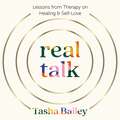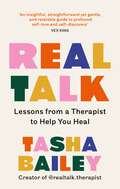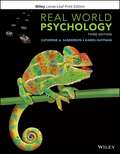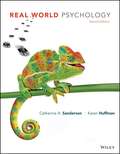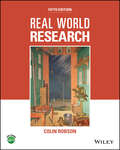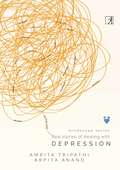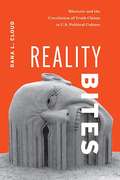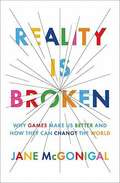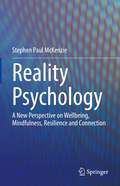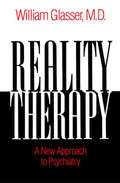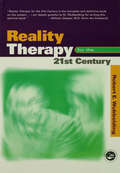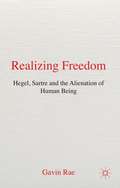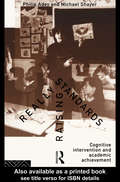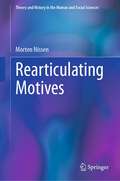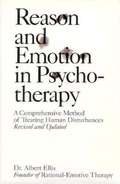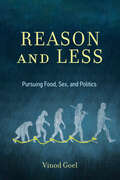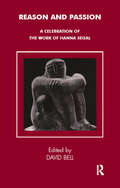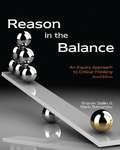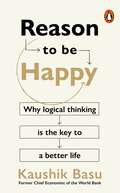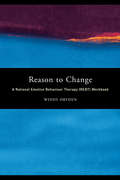- Table View
- List View
Real Talk: Lessons From Therapy on Healing & Self-Love
by Tasha BaileyIt's time to bring therapy out of the therapy room and into the real world.In recent years, therapy and self-care have become familiar buzzwords, but it's clear that people are having to face their emotional difficulties without the tools and insight to work through them. Enter Real Talk: A book to enable readers to have genuine, authentic conversations with themselves, and to start the journey of healing their past experiences and cope with the challenges of modern life.Filled with techniques and wisdom from a therapist's toolkit this is a must-have handbook for optimising your mental health. Drawing on her experience as a qualified psychotherapist and applying her intersectional perspective Tasha Bailey shares the knowledge and skills you need to change your life.Tasha's straight-talking but compassionate style will help readers hold up a mirror to their present situation and make sense of their past - delving into topics such as:· Trauma & inner-child healing· Love, trust, and attachment· Family: intergenerational cycles of behaviour, rupture, and repair.· Self-Esteem, bodies & sexReal Talk contains a collection of lessons which the reader might typically learn in therapy. Tasha teaches readers modern language and ideas about mental health, exploring self-love and self-understanding. Connecting psychological theory, lived experience, references from modern day media and case studies from Tasha's work to create a more current, creative, and inclusive perspective of mental health.(p) 2023 Octopus Publishing Group
Real Talk: Lessons From Therapy on Healing & Self-Love
by Tasha Bailey'Real Talk is like having a kind, supportive and wise one-to-one with a great therapist.' - Abby RawlinsonIt's time to bring therapy out of the therapy room and into the real world.In recent years, therapy and self-care have become familiar buzzwords, but it's clear that people are having to face their emotional difficulties without the tools and insight to work through them. Enter Real Talk: A book to enable readers to have genuine, authentic conversations with themselves, and to start the journey of healing their past experiences and cope with the challenges of modern life.Filled with techniques and wisdom from a therapist's toolkit this is a must-have handbook for optimising your mental health. Drawing on her experience as a qualified psychotherapist and applying her intersectional perspective Tasha Bailey shares the knowledge and skills you need to change your life.Tasha's straight-talking but compassionate style will help readers hold up a mirror to their present situation and make sense of their past - delving into topics such as:· Trauma & inner-child healing· Love, trust, and attachment· Family: intergenerational cycles of behaviour, rupture, and repair.· Self-Esteem, bodies & sexReal Talk contains a collection of lessons which the reader might typically learn in therapy. Tasha teaches readers modern language and ideas about mental health, exploring self-love and self-understanding. Connecting psychological theory, lived experience, references from modern day media and case studies from Tasha's work to create a more current, creative, and inclusive perspective of mental health.
Real Talk: Lessons From Therapy on Healing & Self-Love
by Tasha Bailey'Real Talk is like having a kind, supportive and wise one-to-one with a great therapist.' - Abby RawlinsonIt's time to bring therapy out of the therapy room and into the real world.In recent years, therapy and self-care have become familiar buzzwords, but it's clear that people are having to face their emotional difficulties without the tools and insight to work through them. Enter Real Talk: A book to enable readers to have genuine, authentic conversations with themselves, and to start the journey of healing their past experiences and cope with the challenges of modern life.Filled with techniques and wisdom from a therapist's toolkit this is a must-have handbook for optimising your mental health. Drawing on her experience as a qualified psychotherapist and applying her intersectional perspective Tasha Bailey shares the knowledge and skills you need to change your life.Tasha's straight-talking but compassionate style will help readers hold up a mirror to their present situation and make sense of their past - delving into topics such as:· Trauma & inner-child healing· Love, trust, and attachment· Family: intergenerational cycles of behaviour, rupture, and repair.· Self-Esteem, bodies & sexReal Talk contains a collection of lessons which the reader might typically learn in therapy. Tasha teaches readers modern language and ideas about mental health, exploring self-love and self-understanding. Connecting psychological theory, lived experience, references from modern day media and case studies from Tasha's work to create a more current, creative, and inclusive perspective of mental health.
Real World Psychology
by Karen Huffman Catherine A. SandersonReal World Psychology balances comprehensive coverage of the key concepts in introductory psychology with a concise presentation style and engages students with current and interesting research that explores these concepts in real-life contexts. Real World Psychology features the incomparable author team of Karen Huffman (Palomar College) and Catherine Sanderson (Amherst College) who create an outstanding text that is appealing to students and instructors at a wide range of academic institutions. The new edition has been thoroughly updated and features a new focus on Scientific Thinking and Practical Applications underscoring the fact that connecting the principles of psychological science to everyday life is critical to student engagement, and ultimately key to their success – not only in the introductory psychology course, but in whatever their chosen field of study and in everyday life. Students will leave the course with an appreciation of how a basic, yet scientific understanding of human behavior can benefit them in their studies, in their personal lives, and in their professional endeavors.
Real World Psychology
by Karen Huffman Catherine Sandersonbalances comprehensive coverage of the key concepts in introductory Psychology with a concise writing style and engages students with current and interesting research that explores these concepts in real-life contexts.
Real World Research
by Colin RobsonREAL WORLD RESEARCH Provides students and practitioner alike with clear and systematic guidance on performing social research in applied settings Real World Research supplies the multidisciplinary skills necessary to conduct social research projects inside and outside of the classroom or the workplace. Offering well-balanced coverage of qualitative, quantitative, and mixed methods, this highly practical resource incorporates approaches from different social science disciplines to help readers find answers to real-life research questions in healthcare, education, business and management, and in many other public and private settings. Detailed yet accessible chapters include step-by-step advice for developing a research question, choosing a research design strategy, collecting and analyzing the data, interpreting and reporting the results, and more. The fifth edition contains timely coverage of contemporary methodologies, key ethical issues, and ongoing debates within the field of social research. New and expanded sections address topics such as evidence‐based approaches to social research, ethical considerations when conducting research involving people, carrying out projects based solely on existing research, and the importance and implications of internet-based research. Featuring a wealth of up-to-date examples drawn from a wide range of disciplines, this classic textbook: Focuses on useful real-world research in applied settings such as homes, schools, businesses, and other workplaces Provides a concise overview and a well-defined example of each main step of the research process Highlights the importance of collaboration, cooperation, and active participation in social research Explains flexible research designs using largely qualitative methods, including additional coverage of ethnographic and grounded theory approaches Includes an extensive companion website with numerous research examples, links to journal articles, PowerPoint slides, and many other additional resources Real World Research, Fifth Edition, remains essential reading for those tasked with developing, performing, and reporting the findings of a research project, including students, academics and educators, social scientists, health practitioners, and professionals in a diverse range of fields.
Real stories of dealing with Depression: Mindscape series
by Amrita TripathiDepression in urban India is something we are learning to talk about. But are we really having the conversations we need to? How will we defeat the stigma associated with mental illness in India without being completely open about some of our darkest times? And when we will learn that we are truly Not Alone in our struggle? Many have walked this path, and many have learned how to heal… though there is no one-size-fits-all solution. Ten brave first-person contributors share portions of their journey towards healing, stories that will resonate, move you and fill you with hope. Hear from mental health experts as well to find the answers to several questions: How do you know if you’re depressed? Who should you seek out for help? And what should you say to people who claim that you should just shake off the blues?
Realism and Psychological Science
by David J. MareeThe book provides an argument why realism is a viable metatheoretical framework for psychological science. By looking at some variations of realism such as scientific realism, critical realism, situational realism and Ferraris’ new realism, a realist view of science is outlined that can feature as a metatheory for psychological science. Realism is a necessary correction for the mythical image of science responsible for and maintained by a number of dichotomies and polarities in psychology. Thus, the quantitative-qualitative dichotomy, scientist-practitioner polarity and positivist-constructionist opposition feed off and maintains a mythic image of science on levels of practice, methods and metatheory. Realism makes a clear distinction between ontology and epistemic access to reality, the latter which easily fits with softer versions of constructionism, and the former which grounds science in resistance and possibility, loosely translated as criticism. By taking science as a critical activity an issue such as the quantitative imperative looses its defining force as a hallmark of science - it provides epistemic access to certain parts of reality. In addition, essentially critical activities characteristic of various qualitative approaches may be welcomed as proper science. Academics, professionals and researchers in psychology would find value in situating their scholarly work in a realist metatheory avoiding the pitfalls of traditional methodologies and theories.
Reality Bites: Rhetoric And The Circulation Of Truth Claims In U. S. Political Culture
by Dana L. CloudFake news, alternative facts, post truth--terms all too familiar to anyone in U.S. political culture and concepts at the core of Dana L. Cloud's new book, Reality Bites, which explores truth claims in contemporary political rhetoric in the face of widespread skepticism regarding the utility, ethics, and viability of an empirical standard for political truths. Cloud observes how appeals to truth often assume--mistakenly--that it is a matter of simple representation of facts. However, since neither fact-checking nor "truthiness" can respond meaningfully to this problem, she argues for a rhetorical realism--the idea that communicators can bring knowledge from particular perspectives and experiences into the domain of common sense. <P><P> Through a series of case studies--including the PolitiFact fact-checking project, the Planned Parenthood "selling baby parts" scandal, the Chelsea Manning and Edward Snowden cases, Neil DeGrasse Tyson's Cosmos, the rhetoric of Thomas Paine and the American Revolution, and the Black Lives Matter movement--Cloud advocates for the usefulness of narrative, myth, embodiment, affect, and spectacle in creating accountability in contemporary U.S. political rhetoric. If dominant reality "bites"--in being oppressive and exploitative--it is time, Cloud argues, for those in the reality-based community to "bite back."
Reality Is Broken
by Jane McgonigalVisionary game designer Jane McGonigal reveals how we can harness the power of games to solve real-world problems and boost global happiness. More than 174 million Americans are gamers, and the average young person in the United States will spend ten thousand hours gaming by the age of twenty-one. According to world-renowned game designer Jane McGonigal, the reason for this mass exodus to virtual worlds is that videogames are increasingly fulfilling genuine human needs. In this groundbreaking exploration of the power and future of gaming, McGonigal reveals how we can use the lessons of game design to fix what is wrong with the real world. Drawing on positive psychology, cognitive science, and sociology, Reality Is Broken uncovers how game designers have hit on core truths about what makes us happy and utilized these discoveriesto astonishing effect in virtual environments. Videogames consistently provide the exhilarating rewards, stimulating challenges, and epic victories that are so often lacking in the real world. But why, McGonigal asks, should we use the power of games for escapist entertainment alone? Her research suggests that gamers are expert problem solvers and collaborators because they regularly cooperate with other players to overcome daunting virtual challenges, and she helped pioneer a fast-growing genre of games that aims to turn gameplay to socially positive ends. In Reality Is Broken, she reveals how these new alternate reality games are already improving the quality of our daily lives, fighting social problems such as depression and obesity, and addressing vital twenty-first-century challenges-and she forecasts the thrilling possibilities that lie ahead. She introduces us to games like World Without Oil, a simulation designed to brainstorm-and therefore avert- the challenges of a worldwide oil shortage, and Evoke, a game commissioned by the World Bank Institute that sends players on missions to address issues from poverty to climate change. McGonigal persuasively argues that those who continue to dismiss games will be at a major disadvantage in the coming years. Gamers, on the other hand, will be able to leverage the collaborative and motivational power of games in their own lives, communities, and businesses. Written for gamers and nongamers alike, Reality Is Broken shows us that the future will belong to those who can understand, , and play games. Watch a Video .
Reality Is Broken: Why Games Make Us Better and How They Can Change the World
by Jane McgonigalVisionary game designer Jane McGonigal reveals how we can harness the power of games to solve real-world problems and boost global happiness. More than 174 million Americans are gamers, and the average young person in the United States will spend ten thousand hours gaming by the age of twenty-one. According to world-renowned game designer Jane McGonigal, the reason for this mass exodus to virtual worlds is that videogames are increasingly fulfilling genuine human needs. In this groundbreaking exploration of the power and future of gaming, McGonigal reveals how we can use the lessons of game design to fix what is wrong with the real world.Drawing on positive psychology, cognitive science, and sociology, Reality Is Broken uncovers how game designers have hit on core truths about what makes us happy and utilized these discoveriesto astonishing effect in virtual environments. Videogames consistently provide the exhilarating rewards, stimulating challenges, and epic victories that are so often lacking in the real world. But why, McGonigal asks, should we use the power of games for escapist entertainment alone? Her research suggests that gamers are expert problem solvers and collaborators because they regularly cooperate with other players to overcome daunting virtual challenges, and she helped pioneer a fast-growing genre of games that aims to turn gameplay to socially positive ends.In Reality Is Broken, she reveals how these new alternate reality games are already improving the quality of our daily lives, fighting social problems such as depression and obesity, and addressing vital twenty-first-century challenges-and she forecasts the thrilling possibilities that lie ahead. She introduces us to games like World Without Oil, a simulation designed to brainstorm-and therefore avert- the challenges of a worldwide oil shortage, and Evoke, a game commissioned by the World Bank Institute that sends players on missions to address issues from poverty to climate change.McGonigal persuasively argues that those who continue to dismiss games will be at a major disadvantage in the coming years. Gamers, on the other hand, will be able to leverage the collaborative and motivational power of games in their own lives, communities, and businesses. Written for gamers and nongamers alike, Reality Is Broken shows us that the future will belong to those who can understand, , and play games.Watch a Video
Reality Is Broken: Why Games Make Us Better and How They Can Change the World
by Jane McgonigalA visionary game designer reveals how we can harness the power of games to boost global happiness. With 174 million gamers in the United States alone, we now live in a world where every generation will be a gamer generation. But why, Jane McGonigal asks, should games be used for escapist entertainment alone? In this groundbreaking book, she shows how we can leverage the power of games to fix what is wrong with the real world-from social problems like depression and obesity to global issues like poverty and climate change-and introduces us to cutting-edge games that are already changing the business, education, and nonprofit worlds. Written for gamers and non-gamers alike, Reality Is Broken shows that the future will belong to those who can understand, design, and play games.From the Trade Paperback edition.
Reality Psychology: A New Perspective on Wellbeing, Mindfulness, Resilience and Connection
by Stephen Paul McKenzieThis book provides an introduction to and a dynamic description of a new psychological paradigm that balances the excesses and distortions of the positive psychology paradigm. It offers valuable theoretical and practical content to its readers on the vital need for, nature of and potential for the reality psychology paradigm. It includes concrete steps for this new paradigm to restore the real power of vital psychological knowledge and techniques, which need to be brought back from their association with artificial positivity. This will provide real human benefits, including real mindfulness, real resilience, real behaviour change, and real communication. The book features a presentation of the underlying principles of reality psychology – including the value of a full connection with reality as it really is - rather than as we would like it to be. This will help people thrive in response to as well as survive our great real-life challenges, by developing a deeply practical understanding of reality psychology knowledge and related practice techniques.The book provides considerable theoretical and practical benefits to students of a variety of psychological courses, including positive psychology related courses, and also of many other wellbeing related courses. The book also provides valuable benefits to non-student readers – expert and non-expert.
Reality Therapy
by William GlasserGlasser's classic bestseller, with more than 500,000 copies sold, examines his alternative to Freudian psychoanalytic procedures, explains the procedure, contrasts it to conventional treatment, and describes different individual cases in which it was successful.
Reality Therapy
by William GlasserGlasser's classic bestseller, with more than 500,000 copies sold, examines his alternative to Freudian psychoanalytic procedures, explains the procedure, contrasts it to conventional treatment, and describes different individual cases in which it was successful.
Reality Therapy For the 21st Century
by Robert E. WubboldingThis text is a comprehensive, practical, clearly illustrated examination of reality therapy. It includes an historically significant interview with William Glasser, MD, multicultural applications and research based studies. Its goal is to enhance the skills of helpers so that clients may live a more effective life through a total balance of love, health, and happiness. To help teach reality therapy, the author encapsulates the delivery system into the acronym "WDEP". It is expanded to include 22 types of self-evaluation which counsellors and therapists can use to shorten therapy time in the current managed care environment. Each component of the delivery system is illustrated with dialogues so that the reader can see exactly how the system is practical and immediately usable.
Realizing Freedom: Hegel, Sartre, and the Alienation of Human Being
by Gavin RaeA first in English, this book engages with the ways in which Hegel and Sartre answer the difficult questions: What is it to be human? What place do we have in the world? How should we live? What can we be?
Really Raising Standards: Cognitive intervention and academic achievement
by Philip Adey Dr Michael Shayer MICHAEL ShayerWritten by experienced teachers and educational researchers Phillip Adey and Michael Shayer, Really Raising Standards analyses attempts to teach children to think more effectively and efficiently. Their practical advice on how to improve children's performance by the application of the findings of the CASE research project will radically alter the approach of many professional teachers and student teachers as to the education of children in schools. An important contribution to the application of psychological theory in education.
Rearticulating Motives (Theory and History in the Human and Social Sciences)
by Morten NissenThis book presents a theory of motives that has evolved over decades in dialogue with academics and with practitioners. The key proposal is that of collectively cultivating meta-motives – rather than the ubiquitous recipes for manipulating self-regulation. Cultivating meta-motives can proceed through rearticulating motives. Such rearticulation engages with theories and practices of motivation and motives. First, this is a discussion of the psychologies of motivation, and a reflection of post-psychology as a way forward. Second, this discussion takes us back to fundamental problems with subjectivity, and with psychology, even critical psychology, as a way of addressing it. Third, out of this theoretical work come concepts that are put to work in understanding practices of modelling and cultivating motives – clinical, social work, and educational practices. In the first instance, as a critique of contemporary pragmatic practices, and then by rearticulating aesthetic practices as ways to expand and overcome those. Fourth, this has implications for the cultivation of the competence in care for motives, and for the place of theory in this competence. The book provides both a theoretical argument and a resource for those professionals in education, social work, and health who seek a qualitative understanding of what they do.
Reason and Emotion in Psychotherapy: A Comprehensive Method of Treating Human Disturbances, Revised and Updated
by Albert Ellis[from inside flaps] "Reason and Emotion in Psychotherapy, a seminal work in twentieth-century psychology, was the first book on rational-emotive therapy. Written for psychotherapists, it soon became one of the most important and most quoted books in the field. Although intended for professionals, it has since become a widely popular and indispensable self-help book. This updated and revised edition reflects new findings by Dr. Albert Ellis and his colleagues. Reason and Emotion in Psychotherapy started the cognitive-behavior movement in psychotherapy. When Dr. Ellis began practicing this groundbreaking new therapy in 1955, his was a little-heard voice. Two main forms of psychotherapy, both passive, then dominated the field: Freudian psychoanalysis, with its interminable listening to troubled people's complaints and supposedly unraveling their unconscious "complexes" and purportedly healing them of childhood traumas; and Carl Rogers's client-centered therapy, which forbade therapists from using any active-directive techniques to show clients what really troubled them or what to do about it. Other forms of therapy, such as Adlerian, Gestalt, Jungian, and behavior therapy, existed but had few followers. Reason and Emotion in Psychotherapy helped change all this. Including Dr. Ellis's major papers, it was the pioneering work in cognitive-behavior therapy and presented a revolutionary, powerful, brief, and effective psychological treatment that was deeper and more intensive than either psychoanalysis or the therapy of Rogers and his followers. Dr. Ellis's new approach caught the imagination of practitioners all over the world, and by the late 1960s he was joined by Aaron Beck, William Glasser, Donald Meichenbaum, and a host of other therapists who primarily followed his theories and practices. By the 1970s, Rational-Emotive Behavior Therapy (REBT) and cognitive-behavior therapy were supported by scores of experimental studies and were being used by innumerable mental health practitioners. Today, REBT continues to be increasingly popular and effective. Reason and Emotion in Psychotherapy helped so many therapists and laypeople over the years that a new edition might have seemed unnecessary. But psychotherapy, including REBT, moves on, and Dr. Ellis has expanded his original theory and practice and has added a large number of cognitive, emotive, and behavioral techniques to its innovative multimodal approach. This revised edition therefore includes all the important original theories and practices, as well as a significant number of corrections and changes derived from clinical experience and experimentation, featuring a revision of its famous ABC's on human neurosis. A great many of the therapeutic techniques have been perfected since 1955, and the teachings of unconditional self-acceptance (USA) have been updated."
Reason and Less: Pursuing Food, Sex, and Politics
by Vinod GoelA new, biologically driven model of human behavior in which reason is tethered to the evolutionarily older autonomic, instinctive, and associative systems. In Reason and Less, Vinod Goel explains the workings of the tethered mind. Reason does not float on top of our biology but is tethered to evolutionarily older autonomic, instinctive, and associative systems. After describing the conceptual and neuroanatomical basis of each system, Goel shows how they interact to generate a blended response. Goel&’s commonsense account drives human behavior back into the biology, where it belongs, and provides a richer set of tools for understanding how we pursue food, sex, and politics. Goel takes the reader on a journey through psychology (cognitive, behavioral, developmental, and evolutionary), neuroscience, philosophy, ethology, economics, and political science to explain the workings of the tethered mind. One key insight that holds everything together is that feelings—generated in old, widely conserved brain stem structures—are evolution&’s solution to initiating and selecting all behaviors, and provide the common currency for the different systems to interact. Reason is as much about feelings as are lust and the taste of chocolate cake. All systems contribute to behavior and the overall control structure is one that maximizes pleasure and minimizes displeasure. Tethered rationality has some sobering and challenging implications for such real-world human behaviors as climate change denial, Trumpism, racism, or sexism. They cannot be changed simply by targeting beliefs but will require more drastic measures, the nature of which depends on the specific behavior in question. Having an accurate model of human behavior is the crucial first step.
Reason and Passion: A Celebration of the Work of Hanna Segal (Tavistock Clinic Series)
by David BellThis book provides an account of Hanna Segal's contributions to psychoanalytic theory and practice and gives a picture of her as a person. It covers mainly on clinical and theoretical aspects of psychoanalysis.
Reason in the Balance: An Inquiry Approach to Critical Thinking
by Sharon Bailin Mark BattersbyReason in the Balance focuses broadly on the practice of critical inquiry, the process of carefully examining an issue in order to come to a reasoned judgment. This text emphasizes the various aspects that go into the practice of inquiry, including identifying issues and relevant contexts, understanding competing cases, and making a comparative judgment. Distinctive Features of the Text are: Emphasis on applying critical thinking to complex issues with competing arguments; Inclusion of chapters on inquiry in specific contexts; Attention to the dialogical aspects of inquiry, including sample dialogues; Emphasis on the spirit of inquiry. The Second Edition Features: (i) updated examples and items of current interest (ii) new dialogues on vaccination, prostitution, and climate change (iii) new material on biases in reasoning, including emotional and psychological, social, and cognitive biases (iv) material on deduction and formal logic supplemented with Appendix on Logic on the Web site, including links for further learning and practice.
Reason to Be Happy: Why logical thinking is the key to a better life
by Kaushik Basu'Reason to Be Happy is a wise and witty book that shows how thinking clearly can help us find happiness in our daily lives, get more of what we want, and even make the world a better place' Hannah FryWhy do our friends have more friends than we do? How do you book the best available seats on a plane? And if jogging for ten minutes adds eight minutes to our life expectancy, should we still go jogging?The ability to reason is one of our most undervalued skills. In everyday life, the key is to put yourself in the shoes of a clever competitor and think about how they might respond. Whether you are dealing with events on the scale of the Cuban missile crisis or letting go of anger, leading economist Professor Kaushik Basu shows how game theory - the logic of social situations - can help us achieve better outcomes and lasting happiness.Full of fascinating thought experiments and puzzles, Reason to Be Happy is a paean to the power of rationality. If you want to have a good life and even make the world a better place, you can start by thinking clearly.
Reason to Change: A Rational Emotive Behaviour Therapy (REBT) Workbook
by Windy DrydenRational Emotive Behaviour Therapy (REBT) is an approach to counselling and psychotherapy in which great emphasis is placed on how emotional problems can be caused by the role of thoughts, beliefs and behaviour. However, no book before has taught the skills needed to use this therapeutic approach in practice in a thorough and accessible way.Reason to Change is the first workbook which teaches the practical skills of REBT. Each skill is explained in detail, and examples are given of how each skill can be put into practice. These skills include:* developing a problem list and setting goals* choosing a target problem and assessing a specific example* questioning beliefs* dealing with your doubts, reservations and objections * taking action.By using these skills in an active way, it can be possible to overcome emotional problems such as anxiety, depression, shame, guilt, hurt, unhealthy anger, unhealthy jealousy and unhealthy envy. This book can be used by people on their own, and by those who are consulting an REBT therapist. It will also be of interest to therapists and counsellors.
